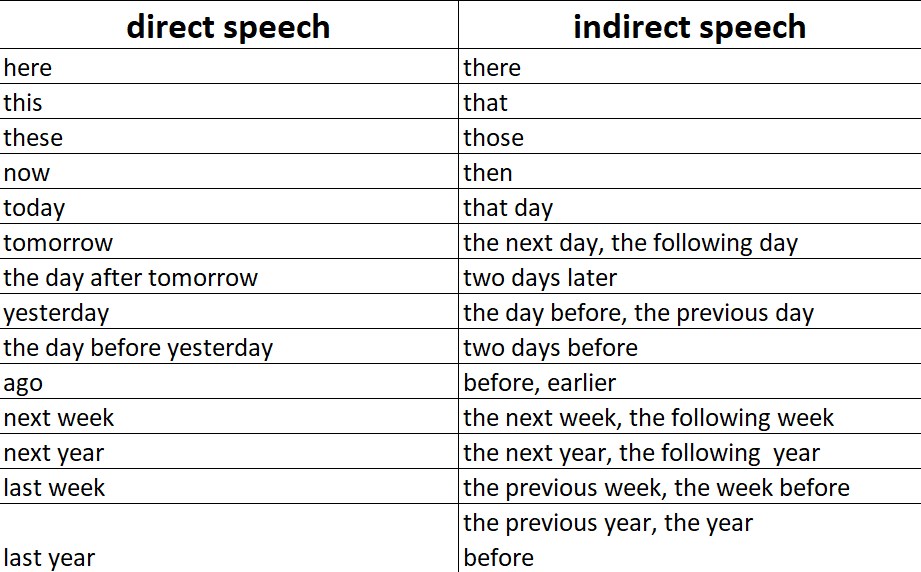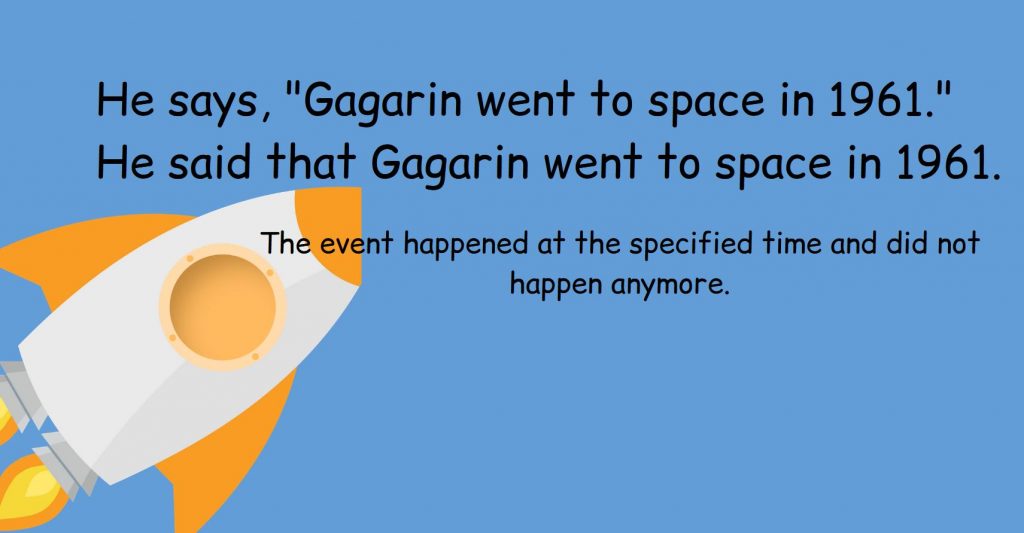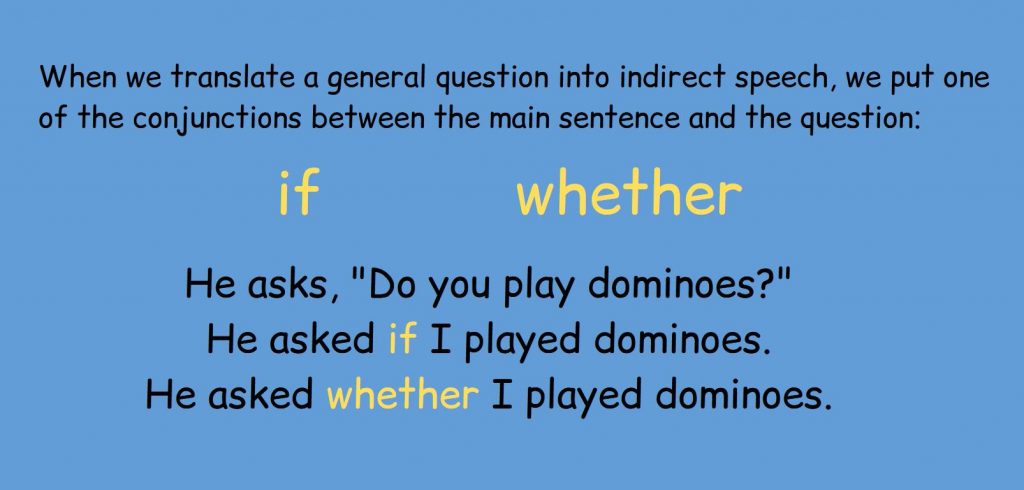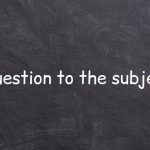

Reported Speech: Rules, Examples and Exercises

Learning how to use reported speech (also called indirect speech) is essential for effective communication in English. It allows us to convey what someone else has said without quoting their exact words. This article will explain the rules, provide examples, and include exercises to help you master reported speech.
To master reported speech with a lot of examples, visit 100+ Reported Speech Examples .
What Is Reported Speech?
Reported speech is when you report or relay what someone else said, but you do not use their exact words. For example:
- Direct speech: She said, “I am tired.”
- Reported speech: She said that she was tired.
Rules for Reported Speech
When changing from direct to reported speech, there are some important rules to follow:
1. Change in Pronouns
Adjust the pronouns based on the speaker and listener.
- Direct: He said, “I love my car.”
- Reported: He said that he loved his car.
2. Change in Tense
The verb tense usually shifts back one step into the past, called backshifting .
Note: If the reporting verb is in the present tense (e.g., He says ), backshifting is not necessary.
3. Changes in Time and Place References
Words related to time and place need to be adjusted to fit the context.
4. Reporting Verbs
Common reporting verbs include said, told, asked, explained, mentioned , etc.
- Said is followed by that (optional): He said (that) he was coming.
- Told requires an object: He told me that he was coming.
5. Reporting Questions
For yes/no questions, use if or whether . For wh- questions, maintain the question word but remove the question structure.
- Yes/No Question: Direct: She asked, “Are you coming?” Reported: She asked if I was coming.
- Wh- Question: Direct: He asked, “Where do you live?” Reported: He asked where I lived.
6. Reporting Commands and Requests
For commands and requests, use tell or ask with an infinitive ( to + verb ).
- Command: Direct: She said, “Close the door.” Reported: She told me to close the door.
- Request: Direct: He said, “Please help me.” Reported: He asked me to help him.
Examples of Reported Speech
Here are examples to illustrate various contexts:
- Direct: “I am learning English,” she said. Reported: She said that she was learning English.
- Direct: “What are you doing?” he asked. Reported: He asked what I was doing.
- Direct: “Don’t touch that!” he said. Reported: He told me not to touch that.
Mixed Tenses
- Direct: “I finished my homework yesterday,” she said. Reported: She said that she had finished her homework the previous day.
Exercises on Reported Speech
Test your understanding with the following exercises.
A. Change the sentences from direct to reported speech.
- She said, “I enjoy reading.”
- He asked, “Where do you live?”
- They said, “We will help you tomorrow.”
- She told me, “Close the window.”
- He asked, “Can you speak French?”
B. Identify the errors in these sentences.
- She said that she will come tomorrow.
- He asked if I am okay.
- They told me that they had finish their work.
- He asked where was I going.
- She said that she loves ice cream.

You may also like

Will vs Be Going To: The Ultimate Guide You Need!

Past Simple – ESL Conversation Questions [PDF]

100+ Reported Speech Examples
Leave a reply cancel reply.
Your email address will not be published. Required fields are marked *

Your way to the top of Grammar...
Indirect Speech: Formula and Rules
- July 3, 2021
We are talking about a very important and interesting topic. We are talking about direct and indirect speech in English and what is the correct formula of the usage.
Remember to read How to learn English with audiobooks for FREE
This topic can seem complicated at the beginning, but necessary to learn. Having this topic solved, you improve your English to a new level, so let’s start to deal with it.
What are Direct and Indirect speech?
In English, there are two ways how we can tell what another person said. Two ways you can say what someone else has said before.
- Direct Speech
- Indirect (Reported) Speech
Note : Indirect speech in different textbooks can be called differently: Indirect Speech or Reported Speech . But these two names mean the same.
Indirect Speech = Reported Speech

Direct speech in English is a type of speech when we retell someone’s speech as it was. We don’t change anything.
John says: I’m a good boy.
To tell what John said, we will say:
We say: John said, “I’m a good boy.”
Indirect speech differs from direct speech in that we DO NOT tell exactly what another person said. We are NOT repeating what someone else said. Indirect speech is when we tell the MEANING of what someone else said.
We say: John said he was a good boy.
Pay attention to what this sentence looks like. Earlier, when John said this, the sentence looked like this:
I am a good boy.
But after WE retell John’s words, in the indirect speech, this sentence looks like this:
John said he was a good boy.
The Quotes and the comma that stood after the name John, separating the speaker from his direct speech, disappeared from this sentence.
In indirect speech, we do not use the separating comma and quotation marks. Because now it is WE are retelling the meaning of what the other person (John) said.

In direct speech, the speaker most often speaks in the first person. That is, the speaker speaks from his person.
John will not talk about himself: John is a good boy . John will say it on his behalf: I am a good boy.
But when we retell the words of John (indirect speech), we cannot speak on his behalf. We cannot say “I am a good boy” because those are not our words. This is John a good boy.
Therefore, in indirect speech, we change “I” to the third person.
He says: I hate you but I need your help.
I retell: He said that he hated me but he needed my help.
To translate direct speech into indirect speech, we use certain rules that you should know.
Let’s take a look at these rules and formulas in order.
Quotation marks and comma
In direct speech, we use a comma to separate the speaker from what he is saying. Direct speech (what the speaker says) is in quotation marks.
When we translate direct speech into indirect speech, we remove quotes and commas.
Jessica says , “I’m from the future.”
We retell Jessica’s words: She said that she was from the future.

Personal and possessive pronouns
When translating direct speech into indirect speech, we change personal and possessive pronouns to third-person pronouns.
Direct Speech : He says, “ I couldn’t stay” Indirect Speech : He said that he couldn’t stay. Direct Speech : Tom says, “ I am deeply disturbed” Indirect Speech : Tom said that he was deeply disturbed.
Note: If in direct speech the speaker tells his own words, then we do not change personal and possessive pronouns.
Direct Speech: I said, “ I will do that” Indirect Speech: I said that I would do that.
Adverbs in direct speech
When we translate adverbs from direct speech to indirect, adverbs change their form.
You can see how adverbs look in direct speech and how adverbs look in indirect speech in this table:

But we don’t always change adverbs this way. We change adverbs only if, when translating from direct speech into indirect speech adverbs cannot express the same meaning as in direct speech.
Take a look at an example:
Mom says, “ Tomorrow we will go to Uncle John’s.” Mom said that the next day we would go to Uncle John’s.
In these examples, we have replaced the adverb tomorrow with the next day . Because we retell Mom’s words on another day. We cannot say tomorrow anymore.
Now look at another example:
Mom says, “We went to visit Uncle John yesterday .”
Now imagine that we are retelling this the next day. We have to say:
Mom said that we went to visit Uncle John the day before yesterday .
If we said “ yesterday “, it would change the meaning of what we want to tell.
If in direct speech in the main sentence the predicate is in Past Simple, then in indirect speech we use the agreement rules.
We put the conjunction “ that ” in front of indirect speech.
Note: We may not use the conjunction that after verbs such as:
He said he found it on the island. He thought he was better than me. He knew he could call you anytime.

Prepositional object
If in direct speech after the verb to say there is a prepositional object, then in order to translate such a sentence into indirect speech, we change the verb to say to tell . In this case, tell is used without the preposition to .
Incorrect : to tell Correct : tell
This means:
She said to me … changes to She told me that …
Note : Remember that in this case we also change the adverbs of place and time and demonstrative pronouns, if they are in direct speech.
Modal verbs
For modals, we use several important rules.
We change modal verbs as well as main verbs when moving from direct to indirect speech.
But we do not change all modal verbs. We leave some verbs in their original form.
Let’s talk about modals in more detail.
Modal verb must
If in direct speech the verb must means an obligation or command, then in the subordinate clause in indirect speech must does NOT change and looks like must .
The teacher says, “You must behave well in class.” The teacher said that we must behave well in class.
If in direct speech the verb must expresses the need, then in the subordinate clause in indirect speech we change the verb must to had to .
Mom says, “You must visit the doctor.” Mom said that I had to visit the doctor.
The past form of Modal verbs in indirect speech
Can and could..
We change the modal verb can in direct speech to could in indirect speech. Could is the past form of the modal verb can .
She says, “I can swim.” She said that she could swim.
May and might.
We change the modal verb may in direct speech to might in indirect speech. Might is the past form of the modal verb may .
John says, “I may propose to Maria.” John said that he might propose to Maria.
Must and had to.
We change the modal verb must in direct speech to had to in indirect speech (if the verb must expresses the need). Had to is the past analog of the modal verb must .

Modal verbs that do not change in indirect speech
The following verbs move from direct to indirect speech in their original form. They don’t change in any way.
- must (if the verb must means an obligation or command)
He says, “I could do this.” He said he could do that.
Let’s take a closer look at these verbs:
The modal verb would in direct speech remains in the form would in indirect speech too.
Mom says, “I would bake a cake.” Mom said she would bake a cake.
If we use the modal verb could in direct speech, then we do not change this verb in any way in indirect speech. Because could is a past form already (It’s the past form of the modal verb can ).
John says, “I could learn to swim” John said he could learn to swim.
The modal verb might does not change its form when we translate this verb from direct to indirect speech. Because the modal might is the past form of the modal may .
He says, “I might ask the same question again”. He said that he might ask the same question again.
We do not change should when switching to indirect speech. Because should is considered the past form of the modal verb shall .
He says, “We should see Mr. Gannon” He said that we should see Mr. Gannon.
We do not change the modal verb OUGHT TO when translating this verb into indirect speech.
She says, “You ought to be angry with John” She said that I ought to be angry with John
Exceptions to the rules
Let’s talk about the important exceptions to the rules of this lesson.
- We can exclude the word that out of affirmative sentences in indirect speech. Because in indirect speech in affirmative sentences, the meaning of the sentence does not change, regardless of whether we use that or not.
He said ( that ) he thought you seemed depressed. He said ( that ) there was no need. He said ( that ) he had many friends.
- If in direct speech we are talking about a specific event that happened at exactly the specified time and did not happen anymore, then we translate the sentence into indirect speech without the agreement.
He says, “Gagarin went to space in 1961.” He said that Gagarin went to space in 1961.
The event that we are talking about in this example happened at exactly the specified time and did not happen anymore.

- If in direct speech we use verbs such as:
then when translating into indirect speech, we do not change the form of these verbs. These verbs remain in their form.
She says, “We might find some treasure” She said that we might find some treasure.
He says, “I should do it”. He said that he should do it.
- If indirect speech begins with the verb say or tell which is used in the form:
- Present Simple
- Present Perfect
- Future Simple
then we translate such a sentence into indirect speech without changing the tense to the past:
She says, “I cook deliciously.” She says that she cooks deliciously. He says, “I have a new smartphone.” He says that he has a new smartphone. She will say, “I didn’t know it.” He will say (that) he didn’t know it.
- If in direct speech we are talking about a well-known fact or law of nature, then we do not transfer to the past such a fact or the law of nature when translating from direct speech to indirect.
He says, “After winter comes spring.” He said that after winter comes spring. She says, “Lions don’t hunt camels.” She said that lions don’t hunt camels.
- If in direct speech we use tenses:
- Past Continuous
- Past Perfect
- Past Perfect Continuous
then when translating into indirect speech, we do not change the sentence, we do not translate the sentence into the past.
He says, “I had fixed my car.” He said he had fixed his car. He says, “I was skiing .” He said he was skiing . He says, “I had been all alone for a very long time”. He said that he had been all alone for a very long time.
Interrogative (question) sentences in indirect speech
Look at the following rules and nuances to know how to correctly translate interrogative (question) sentences from direct speech to indirect speech:
- When we translate a general question into indirect speech, we put one of the conjunctions between the main sentence and the question:
He asks, “Do you play dominoes?” He asked if I played dominoes. He asked whether I played dominoes.

- If we translate an interrogative sentence from direct speech to indirect speech, then we change the interrogative word order to direct word order.
We remove the auxiliary verb that was used in the interrogative sentence. We put the subject before the predicate as it should be for the direct word order.
He asks, “Where are you going?” He asked where I was going.
- If in an indirect sentence we ask a question using the verb say and if there is no indirect object in the main sentence, then we change the verb say to one of these words:
- want to know
She asks, “Where you are?” She wanted to know where you were.
- When translating an interrogative sentence from direct speech into indirect speech, we change all pronouns, verbs, adverbs of place, adverbs of time.
She asks, “What do these letters mean?” She asked what those letters mean.
Special questions in indirect speech
Special questions (or Wh-questions) are questions that begin with an additional, question word.
In indirect speech, such a question should also begin with a question word.
This question word also serves as conjunction. This word attaches the question part to the main sentence.
In the question part, we use direct word order.
At the same time, we comply with all the rules for the Sequence of tenses.
My dad asks, “What do you plan to do with yourself?” My dad asked what I planned to do with myself.
Imperative sentences in indirect speech
When translating imperative sentences from direct to indirect speech, we must take into account several nuances:
- Orders in indirect speech look like this:
He said, “ Go now!” He said to go then. She says, “ Carry my bag” She asked to carry her bag.
We use the verb to say when we translate an ordinary sentence into indirect speech. But in imperative sentences, we change the verb to say to a verb that expresses an order or request:
She says , “Carry my bag” She asked to carry her bag.

- In direct speech in the imperative mood, we often use:
let’s (let us)
let’s encourage the speaker and the person to do something together.
In indirect speech, we change let’s to to suggest . For example:
She says, “ let’s do that!” She suggested to do that.
- In indirect speech, we put a noun after the verb that expresses an order or request. The noun is the one to whom this request or order is addressed. Then we use the infinitive.
She says, “Replace him, John “ She asked John to replace him.
- We can strengthen the request or order in indirect speech if we add verbs such as:
- to recommend
- to urge etc.
She says , “Read this book” She ordered ( advised, recommend ) me to read that book.
- In order to make a negative imperative sentence in direct speech, we need:
not + infinitive
He says, “Don’t cry.” He said to me not to cry.
- In direct speech, we often do not name the person to whom the order or request is addressed. But when translating an imperative sentence from direct speech to indirect speech, we must indicate the one to whom the order or request is addressed.
For this, we use a noun or a pronoun.
She says, “Speak to him!” She asked me to speak to you.
Present and future tense in indirect speech
Most often, we translate the future and the present into the past.
He says, “I have two brothers” He says that he had two brothers She says, “I do this every time” She says that he did that every day. He says, “I write books” He says that he wrote books. She says, “I am reading” She said that she was reading. He says, “I can swim” He said that he could swim. He says, “I will help you” He said that he would help me.
Past tense in indirect speech
When we translate a sentence written in the past into indirect speech, we can leave it unchanged or we can change the past to the Past Perfect.
He says, “I saw this movie” He said that he saw that movie. He said that he had seen that movie.
What if in direct speech the main verb is already in Past Perfect?
In this case, the verb in Past Perfect remains unchanged. The verb in Past Perfect in direct speech remains in Past Perfect in indirect speech too.
He says, “I had bought I new house” He said that he had bought a new house.
Hello! If you would like to thank me for the articles I wrote, you can click Buy me a coffee . Thank you! ❤❤❤
Recommended reading: Complex Sentence in English.
Related Posts

Prepositions of Place in English Grammar

Prepositions of Reason and Purpose

Word Order in Interrogative Sentence

Direct Word Order in English Sentences

Difference Between IN ON AT as Prepositions of Place

Zero Conditional In English
Trending now.


IMAGES
VIDEO